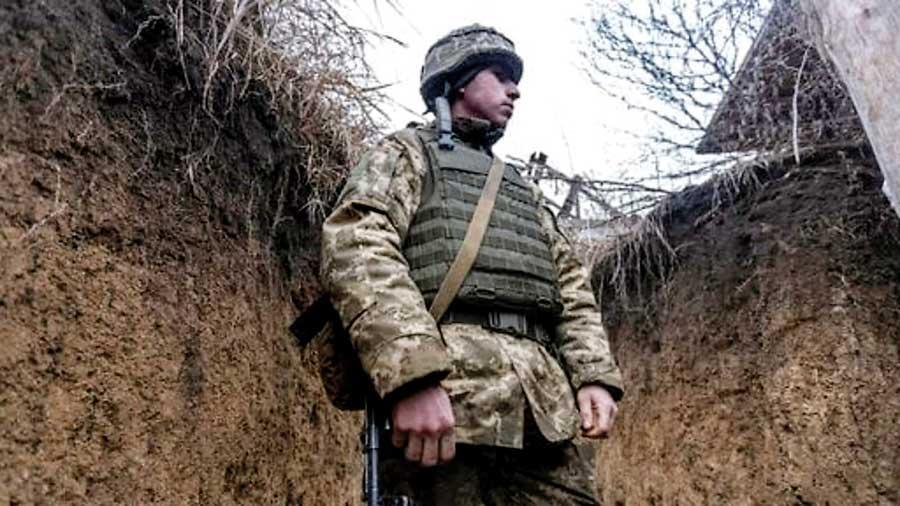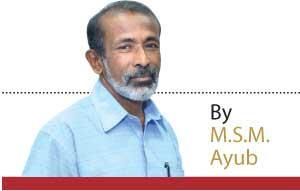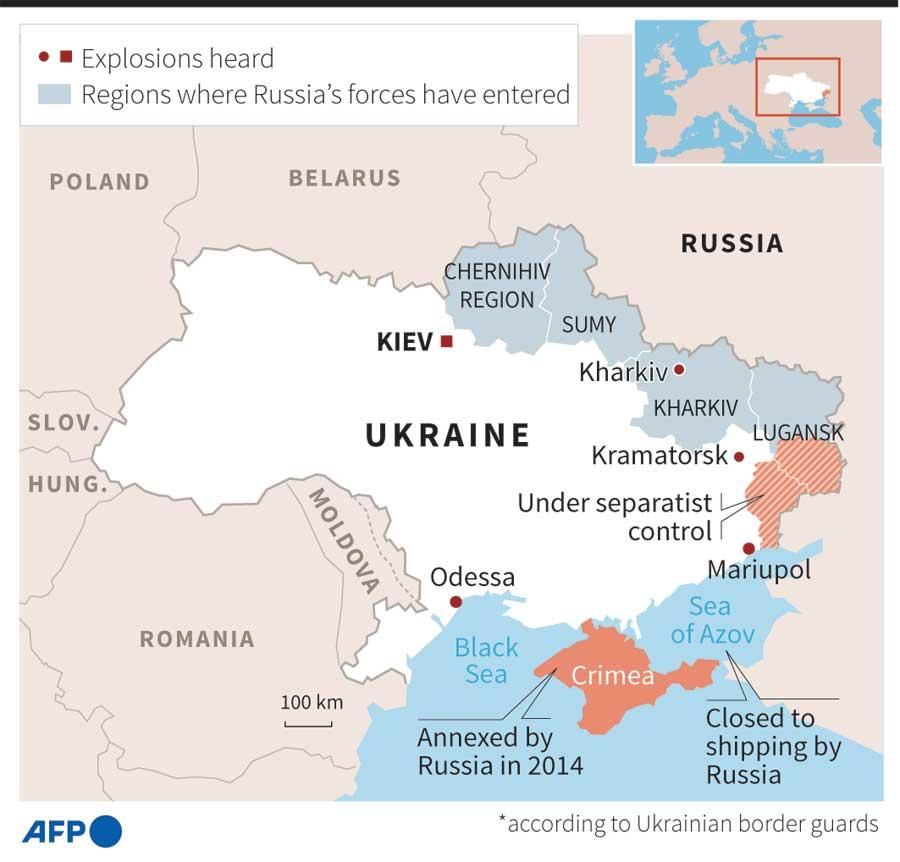25 Feb 2022 - {{hitsCtrl.values.hits}}

Ukrainian soldier stands in the trench on the line of separation from pro-Russian rebels, Mariupol, Donetsk region, Ukraine early this week
Russian President Vladimir Putin on February 21 recognized two breakaway regions in Eastern Ukraine, the self-proclaimed Donetsk People’s Republic and the Luhansk People’s Republic as independent and instructed his Defence Ministry to send troops into those territories, for what he said peacekeeping in
Republic as independent and instructed his Defence Ministry to send troops into those territories, for what he said peacekeeping in
the two areas.
Yesterday he announced “military operations” in the same areas.
This follows a long-drawn conflict between Russia and the NATO over Ukraine’s possible admission into the NATO which had resulted in over 100,000 Russian troops having been amassed along the Russian-Ukrainian border for the past few weeks. At a time when the mostly Russian speaking Donbas region in Ukraine which consists of Donets and Luhansk have still universally been recognized as a part of Ukraine, this move by Putin inevitably amounts to an invasion of Ukraine.
The conflict reminds us of a similarly tense but not so drastic situation involving Sri Lanka and India in the early 1980s which ultimately had a heavy impact on the politics and lives of people in Sri Lanka, in the years that followed.
In both cases, it was a matter of a small country acting against the security interests of a giant neighbour and the latter in turn taking heavy-handed action against the small country in violation of international laws.
Also in both cases, a community in the small country that is linguistically connected across the border to the bigger country has been used as a cat’s paw by the bigger country to penalize the small country.
Another parallel is that both the bigger countries got an opportunity to claim that they were acting in the interest of that linguistically connected community in the smaller countries.
During the Cold War in the 1970s, Sri Lanka and India respectively under Prime Ministers Sirima Bandaranaike and Indira Gandhi were aligned to the Soviet Bloc. However, President J.R. Jayewardene who defeated Mrs Bandaranaike at the 1977 General Elections changed camp and strengthened the relationship with the US-led Western Bloc, irritating Indian Premier Indira Gandhi.
"As they attempted to isolate India forty years ago, the West takes steps now to isolate Russia by admitting countries of the former Soviet Bloc into the NATO’s fold while Russia wants to prevent it from happening and be the leader of the region"
He further provoked Indian leaders by allowing Israel, a strong ally of the US to open an “Interest Section” within the US embassy in Colombo.
Despite Jayewardene not having any animosity towards India, these actions by him taken out of his strong anti-Socialist policy was treated by Indian leaders as a threat to their country. They felt that Jayewardene had allowed the West to encircle India, as the then Pakistan President General Zia-Ul-Haq and Bangladesh after President Zia-ur Rahman’s tenure have been following a pro-Western policy.
Hence, India resorted to punitive actions against Sri Lanka using the Tamils in the Northern and Eastern Provinces in Sri Lanka.
By the time, the ethnic problem in Sri Lanka had taken a drastic turn with the main Tamil alliance; the Tamil United Liberation Front (TULF) having adopted the Separatist Vaddukkoddai Resolution and dozens of Tamil armed groups having emerged to fight for Tamil Eelam, as they called it. The tens of thousands of refugees who by the early eighties had crossed the Palk Strait and taken refuge in Tamil Nadu had initially become a tool for Indira Gandhi to poke the finger into the ethnic strife in Sri Lanka.
Mrs Gandhi, in the guise of taking steps in the interests of the Tamils battered by the fighting between the armed forces and the Tamil armed groups in North-Eastern Sri Lanka and the Sri Lankan refugees in India, began to retaliate to the Jayewardene’s pro-Western policy overtly by soft diplomacy – pressing Jayewardene to implement a power-sharing programme that would satisfy the Tamil leaders - but at the same time providing arms and ammunition, weapons training and funds to the main four Tamil armed groups in Sri Lanka.
In a parallel move with Putin’s order to maintain peace in the Donbas region, the situation came to a head during the tenure of Rajiv Gandhi - Indira’s son – when he ordered the Indian Navy and the Air Force to violate Sri Lanka’s territorial waters and the air space, in order to supply food to the Tamils in the war-ravaged areas in Sri Lanka.
Finally, India and Sri Lanka signed a “Peace Accord” in 1987 providing for the creation of Provincial Councils in Sri Lanka which now is a part of the island’s Constitution, while Tamils still calling for a lasting solution to the ethnic problem.
With the geopolitical context having been changed with the dissolution of the United Soviet Socialist Republics (USSR), India, being now an ally of the US is just doing lip service to the Tamil interests.
In the current conflict involving Russia and Ukraine, Both the US and Russia want to make Ukraine a cog in their regional hegemonic dominance. Western countries want to admit Ukraine into the NATO which Ukraine also prefers.
Russia views this as a threat to its security. 14 countries - which were former republics of USSR and Yugoslavia as well as the former Socialist countries in Eastern Europe – have already joined the NATO. Russia wants to scuttle this trend from continuing and thereby preventing NATO tanks from rolling closer to its borders.
Russian President Vladimir Putin who minces no words in this regard has issued demands to the West, that Ukraine is prevented from joining the NATO military alliance. Putin views Ukraine as an extension of what he calls “Historical Russia” — a part of the Russian Empire and the Soviet Union, and within Moscow’s “sphere of influence” today. However, the US argues that countries have the right to choose their own allies.
Russia also wants NATO arms out of Eastern Europe, a ban on intermediate-range missiles in Europe - in effect, reinstating a Cold War-era treaty abandoned in 2019 by the Trump administration.
"The conflict reminds us of a similarly tense but not so drastic situation involving Sri Lanka and India in the early 1980s which ultimately had a heavy impact on the politics and lives of people in Sri Lanka, in the years that followed"
It says Ukraine must meet its obligations under the 2015 agreements to end the fighting between Ukraine’s army and pro-Russian separatists in the eastern Ukrainian region of Donbas that has already killed over 15,000 people. The West argues that these demands violate the sovereign rights of
independent Ukraine.
Russia, just like India did in respect of Sri Lanka in the eighties, wants to have leaders supportive of its policies and actions in neighbouring countries. But what worries is its choice to penalize those countries disagreeing to do so. After a street revolution ousted Ukraine’s pro-Russian president Viktor Yanukovych in 2014, Russia annexed Crimea which was a peninsula in the south of Ukraine later that year.
Reminding India’s sponsorship of separatism in Sri Lanka, Ukraine’s desire to join the Western alliance also led to Russia’s sponsorship of separatists in the country’s eastern Donbas region, fueling a civil war.
In essence, as they attempted to isolate India forty years ago, the West takes steps now to isolate Russia by admitting countries of the former Soviet Bloc into the NATO’s fold while Russia wants to prevent it from happening and be the leader of the region.
The conflict of interests of these two big powers would occasionally be indicated in various clashes in countries in the region. This time it is being manifested in Ukraine. However, in the event of a war, it would be the Ukrainian people who are going to pay the price, like Sri Lankans, especially the Tamils did, not the West or Russia.

27 Nov 2024 6 hours ago
27 Nov 2024 7 hours ago
27 Nov 2024 7 hours ago
27 Nov 2024 8 hours ago
27 Nov 2024 8 hours ago